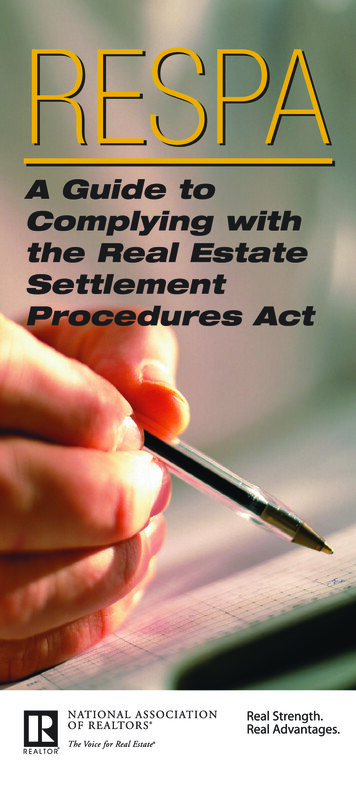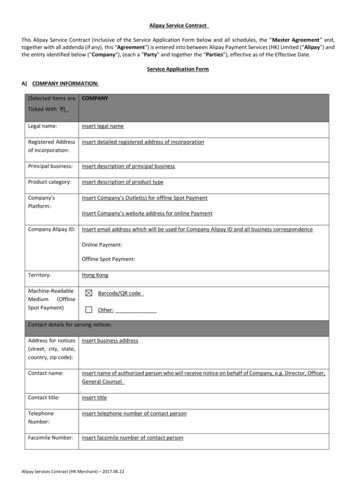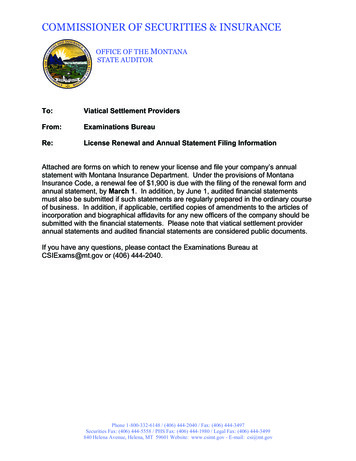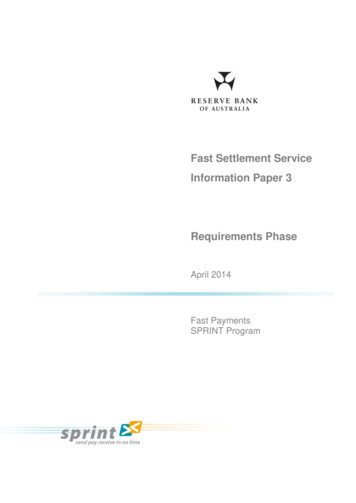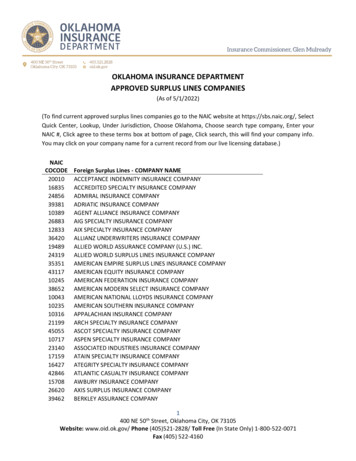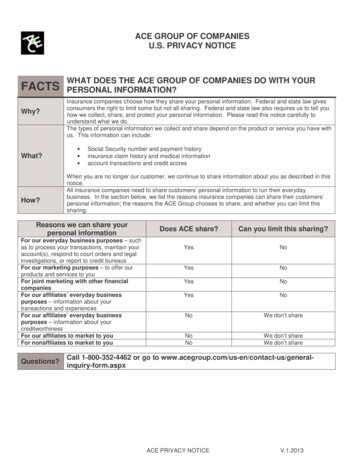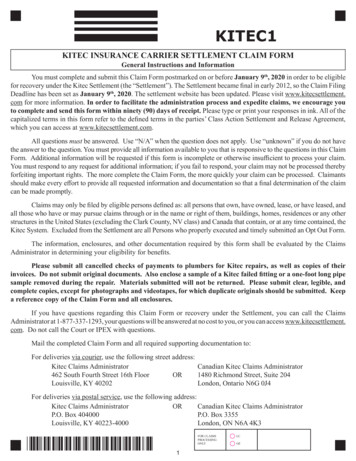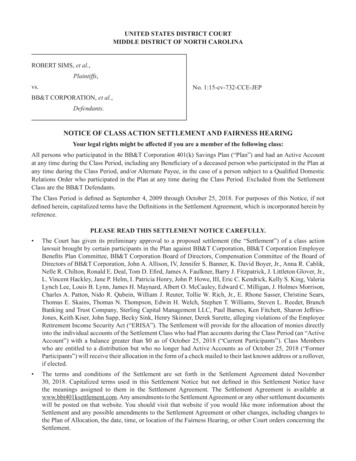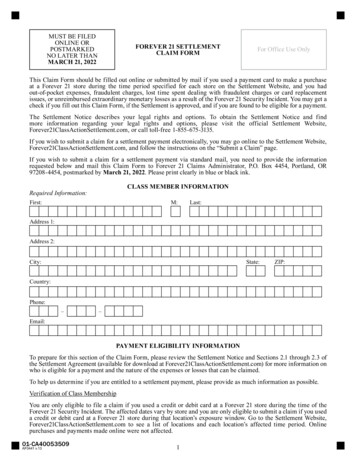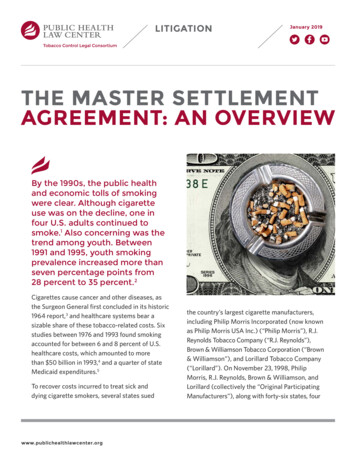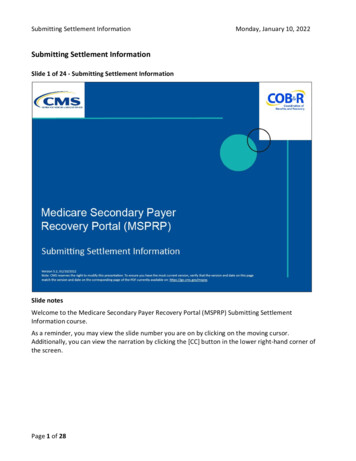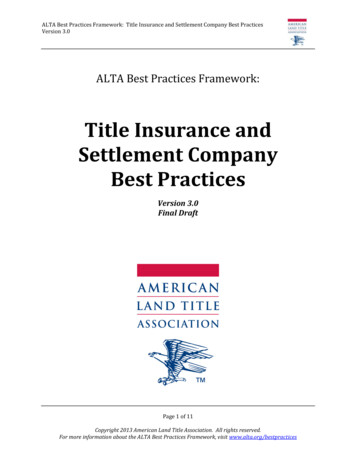
Transcription
ALTA Best Practices Framework: Title Insurance and Settlement Company Best PracticesVersion 3.0ALTA Best Practices Framework:Title Insurance andSettlement CompanyBest PracticesVersion 3.0Final DraftPage 1 of 11Copyright 2013 American Land Title Association. All rights reserved.For more information about the ALTA Best Practices Framework, visit www.alta.org/bestpractices
ALTA Best Practices Framework: Title Insurance and Settlement Company Best PracticesVersion 3.0ALTA Best Practices FrameworkThe ALTA Best Practices Framework has been developed to assist lenders in satisfying theirresponsibility to manage third party vendors. The ALTA Best Practices Framework is comprised ofthe following documentation needed by a company electing to implement such a program. ALTA Best Practices Framework: Title Insurance and Settlement Company Best PracticesALTA Best Practices Framework: Assessment ProceduresALTA Best Practices Framework: Certification Package (Package includes 3 Parts)Version History and .510/17/2019 3.0NotesPublication of the ALTA Title Insurance and Settlement Company BestPractices, approved by the ALTA Board of Governors on December 20,2012.Publication of the revised ALTA Title Insurance and SettlementCompany Best Practices, along with other documents in the ALTABest Practices Framework, approved by the ALTA Board of Governorson July 19, 2013.Publication of the revised ALTA Title Insurance and SettlementCompany Best Practices (including addition of third-party signingprofessionals provision), along with other documents in the ALTABest Practices Framework, approved by the ALTA Board of Governorson September 19, 2016.Publication of the revised ALTA Title Insurance and SettlementCompany Best Practices, along with other documents in the ALTABest Practices Framework, approved by the ALTA Board of Governorson June 6, 2019.Page 2 of 11Copyright 2013 American Land Title Association. All rights reserved.For more information about the ALTA Best Practices Framework, visit www.alta.org/bestpractices
ALTA Best Practices Framework: Title Insurance and Settlement Company Best PracticesVersion 3.0Title Insurance and Settlement Company Best PracticesMission Statement ALTA seeks to guide its membership on best practices to protect consumers, promotequality service, provide for ongoing employee training, and meet legal and marketrequirements. These practices are voluntary and designed to help members illustrate toconsumers and clients the industry’s professionalism and best practices to help ensure apositive and compliant real estate settlement experience. These best practices are notintended to encompass all aspects of title or settlement company activity. ALTA is publishing these best practices for the mortgage lending and real estatesettlement industry. ALTA accepts comments from stakeholders as the Associationseeks to continually improve these best practices. A formal committee of ALTAmembers regularly reviews and makes improvements to these best practices, seekingcomment on each revision.DefinitionsBackground Check: A background check is the process of compiling and reviewing bothconfidential and public employment, address, and criminal records of an individual or anorganization. Background checks may be limited in geographic scope. This provision and use ofthese reports are subject to the limitations of federal and state law.Company: The entity implementing these best practices.Escrow: A transaction in which an impartial third party acts in a fiduciary capacity for the seller,buyer, borrower, or lender in performing the closing for a real estate transaction according to localpractice and custom. The escrow holders have fiduciary responsibility for prudent processing,safeguarding and accounting for funds and documents entrusted to them.Escrow Trust Account: An account to hold funds in trust for third parties, including parties to areal estate transaction. These funds are held subject to a fiduciary capacity as established bywritten instructions.Federally Insured Financial Institutions: A financial institution that has its deposits insured byan instrumentality of the federal government, including the Federal Deposit Insurance Corporation(FDIC) and National Credit Union Administration (NCUA).Licenses: Title Agent or Producer License or registration, or any other business licensingrequirement as required by state law, or a license to practice law, where applicable.Page 3 of 11Copyright 2013 American Land Title Association. All rights reserved.For more information about the ALTA Best Practices Framework, visit www.alta.org/bestpractices
ALTA Best Practices Framework: Title Insurance and Settlement Company Best PracticesVersion 3.0Non-public Personal Information: Personally identifiable data such as information provided by acustomer on a form or application, information about a customer’s transactions, or any otherinformation about a customer which is otherwise unavailable to the general public. NPI includesfirst name or first initial and last name coupled with any of the following: Social Security Number,driver’s license number, state-issued ID number, credit card number, debit card number, or otherfinancial account numbers.Positive Pay or Reverse Positive Pay: Any system by which the authenticity of a check isdetermined before payment is made by the financial institution against which the check is written.Settlement: In some areas called a “closing.” The process of completing a real estate transaction inaccordance with written instructions during which deeds, mortgages, leases and other requiredinstruments are executed and/or delivered, an accounting between the parties is made, the fundsare disbursed and the appropriate documents are recorded.Trial Balance: A list of all open individual escrow ledger record balances at the end of thereconciliation period.Three-Way Reconciliation: A three-way reconciliation is a method for discovering shortages(intentional or otherwise), charges that must be reimbursed or any type of errors or omissions thatmust be corrected in relation to an Escrow Trust Account. This requires the escrow trial balance,the book balance and the reconciled bank balance to be compared. If all three parts do not agree,the difference shall be investigated and corrected.Best Practices1. Best Practice: Establish and maintain current License(s) as required to conduct thebusiness of title insurance and settlement services.Purpose: Maintaining state mandated insurance licenses and corporate registrations (asapplicable) helps ensure Company remains in good standing with the state.Procedures to meet this best practice: Establish and maintain applicable business License(s).Establish and maintain compliance with Licensing, registration, or similar requirementswith the applicable state regulatory department or agency.Establish and maintain appropriate compliance with ALTA’s Policy Forms Licensingrequirement.Page 4 of 11Copyright 2013 American Land Title Association. All rights reserved.For more information about the ALTA Best Practices Framework, visit www.alta.org/bestpractices
ALTA Best Practices Framework: Title Insurance and Settlement Company Best PracticesVersion 3.0 For each Company office location performing settlement services, verify the listing in theALTA Registry (subject to those business entity types supported by the ALTA Registry).2. Best Practice: Adopt and maintain appropriate written procedures and controls forEscrow Trust Accounts allowing for electronic verification of reconciliation.Purpose: Appropriate and effective escrow controls and staff training help title and settlementcompanies meet client and legal requirements for the safeguarding of client funds. Theseprocedures help ensure accuracy and minimize the exposure to loss of client funds. Settlementcompanies may engage outside contractors to conduct segregation of trust accounting duties.Procedures to meet this best practice: Escrow funds and operating accounts are separately maintained.o Escrow funds or other funds Company maintains under a fiduciary duty to anotherare not commingled with Company’s operating account or an employee ormanager’s personal account.Escrow Trust Accounts are prepared with Trial Balances.o On at least a monthly basis, Escrow Trust Accounts are prepared with Trial Balances(“Three-Way Reconciliation”), listing all open escrow balances.Escrow Trust Accounts are reconciled.o On at least a daily basis, reconciliation of the receipts and disbursements of theEscrow Trust Account is performed.o On at least a monthly basis, a Three-Way Reconciliation is performed reconciling thebank statement, check book and Trial Balances.o Segregation of duties is in place to help ensure the reliability of the reconciliationand reconciliations are conducted by someone other than those with signingauthority.o Results of the reconciliation are reviewed by management and are accessibleelectronically by Company’s contracted underwriter(s).Escrow Trust Accounts are properly identified.o Accounts are identified as “escrow” or “trust” accounts. Appropriate identificationappears on all account-related documentation including bank statements, bankagreements, disbursement checks and deposit tickets.Outstanding file balances are documented.Transactions are conducted by authorized employees only.o Only those employees whose authority has been defined to authorize banktransactions may do so. Appropriate authorization levels are set by Company andreviewed for updates annually. Former employees are immediately deleted as listedsignatories on all bank accounts.Page 5 of 11Copyright 2013 American Land Title Association. All rights reserved.For more information about the ALTA Best Practices Framework, visit www.alta.org/bestpractices
ALTA Best Practices Framework: Title Insurance and Settlement Company Best PracticesVersion 3.0 Unless directed by the beneficial owner, Escrow Trust Accounts are maintained inFederally Insured Financial Institutions.Utilize Positive Pay or Reverse Positive Pay, if available in the local marketplace, andhave policies and procedures in place that prohibit or control the use of AutomatedClearing House transactions and international wire transfers.Background Checks are completed in the hiring process. At least every three years,obtain Background Checks going back five years for all employees who have access tocustomer funds.Ongoing training is conducted for employees in management of escrow funds andescrow accounting.A written wire transfer procedure is in place and tested at least annually.o For outgoing wire transfers, this includes a procedure to verify wire transferinstructions independent of the initial communication.o For incoming wire transfers, this includes a procedure to alert consumers regardingthe risks of wire fraud and guidelines to mitigate losses.A written wire fraud response procedure, which includes the recommendations of theALTA Rapid Response Plan, is in place and is updated at least annually.3. Best Practice: Adopt and maintain a written privacy and information security program toprotect Non-public Personal Information as required by local, state and federal law.Purpose: Federal and state laws (including the Gramm-Leach-Bliley Act) require title companies todevelop a written information security program that describes the procedures they employ toprotect Non-public Personal Information. The program must be appropriate to Company’s size andcomplexity, the nature and scope of Company’s activities, and the sensitivity of the customerinformation Company handles. A Company evaluates and adjusts its program in light of relevantcircumstances, including changes in Company’s business or operations, or the results of securitytesting and monitoring.Procedures to meet this best practice: Establish a written information security plan designed to protect to protect nonpublicinformation in the Company’s possession and detect loss of nonpublic informationbased on the size and complexity of the Company’s operationso Physical security of Non-public Personal Information. Restrict access to Non-public Personal Information to authorizedemployees who have undergone Background Checks at hiring. Prohibit or control the use of removable media. Use only secure delivery methods when transmitting Non-publicPersonal Information.Page 6 of 11Copyright 2013 American Land Title Association. All rights reserved.For more information about the ALTA Best Practices Framework, visit www.alta.org/bestpractices
ALTA Best Practices Framework: Title Insurance and Settlement Company Best PracticesVersion 3.0o Network security of Non-public Personal Information. Maintain and secure access to Company information technology Develop guidelines for the appropriate use of Company informationtechnology. Ensure secure collection and transmission of Non-public PersonalInformation.Establish a written plan for the disposal and maintenance of non-public personalinformation.o Federal and state laws require companies that possess records containing Nonpublic Personal Information to maintain and dispose of such records (includingelectronically-stored records) in a manner that protects against unauthorized accessto or use of the Non-public Personal Information.o Companies must securely maintain and dispose of records containing Non-publicPersonal Information pursuant to an established timeframe for retaining records, asdocumented in Company’s information security program, that takes intoconsideration the appropriate legal, regulatory, and business requirements.Establish a written disaster management and business continuity plan outliningprocedures to recover and maintain information and business functions in the event of adisruption.Manage and train employees to help ensure compliance with Company’s informationsecurity program.Oversee service providers, including third-party signing professionals, to help ensurecompliance with Company’s information security program.o Companies should take reasonable steps to select and retain service providers thatare capable of appropriately safeguarding Non-public Personal Information.Audit and oversee testing procedures to help ensure compliance with Company’sinformation security program.o Companies should review their privacy and information security procedures toidentify reasonably foreseeable internal and external threats that could result inunauthorized access, transmission, disclosure, misuse, alteration or destruction ofNon-public Personal Information.Establish a written incident response plan designed to promptly respond to, andrecover from, a breach that compromises the confidentiality, integrity, or availability ofNon-public Personal Information in the Company’s possession.o Establish internal and service provider processes for determining the size, natureand scope of any incident.o Establish document and reporting procedures for actions taken to respond to anincident.Page 7 of 11Copyright 2013 American Land Title Association. All rights reserved.For more information about the ALTA Best Practices Framework, visit www.alta.org/bestpractices
ALTA Best Practices Framework: Title Insurance and Settlement Company Best PracticesVersion 3.0Notification of security breaches to customers and law enforcement in accordancewith applicable federal and state law. Utilize multifactor authentication for all remotely-hosted or accessible systems storing,transmitting or transferring non-public personal information. Post Company’s privacy policy on their websites or provide information directly tocustomers in another useable form.4. Best Practice: Adopt standard real estate settlement procedures and policies that helpensure compliance with Federal and State Consumer Financial Laws as applicable to theSettlement process.oPurpose: Adopting appropriate policies and conducting ongoing employee training helps ensureCompany can meet state, federal, and contractual obligations governing the Settlement.Procedures to meet this best practice: Recording procedures.o Review legal and contractual requirements to determine Company obligations torecord documents and incorporate such requirements in its written procedures. Submit or ship documents for recording to the county recorder (orequivalent) or the person or entity responsible for recording within two (2)business days of the later of (i) the date of Settlement, or (ii) receipt byCompany if the Settlement is not performed by Company. Track shipments of documents for recording. Ensure timely responses to recording rejections. Addressing rejected recordings to prevent unnecessary delay. Verify that recordation actually occurred and maintain a record of therecording information for the document(s).Pricing procedures.o Maintain written procedures to help ensure that customers are charged the correcttitle insurance premium and other rates for services provided by Company. Thesepremiums and rates are determined by a mix of legal and contractual obligations. Utilize rate manuals and online calculators, as appropriate, to help ensurecorrect fees are being charged for title insurance policy premiums, statespecific fees and endorsements. Ensure discounted rates are calculated and charged when appropriate,including refinance or reissue rates. Quality check files after Settlement to help ensure consumers were chargedthe company’s established rates. Provide timely refunds to consumers when an overpayment is detected.Third-party signing professional procedures.Page 8 of 11Copyright 2013 American Land Title Association. All rights reserved.For more information about the ALTA Best Practices Framework, visit www.alta.org/bestpractices
ALTA Best Practices Framework: Title Insurance and Settlement Company Best PracticesVersion 3.0ooMaintain written procedures to help ensure that third-party signing professionals,including notaries public, engaged by the Company possess the appropriatequalifications, professionalism, and knowledge, including the standards describedbelow. These requirements are determined by a mix of legal and contractualobligations. Verify that the third-party signing professional is covered byi.Errors and Omissions insurance, andii.Notary surety bond, if required by state law; and Require that third-party signing professionals:i.Furnish evidence of their current state licensure, where required, orevidence if they have attained a recognized and verifiable industrydesignation, and;ii.Provide an acknowledgement of compliance with Company’sinstructions and Company’s information security program asdetailed in Pillar 3 of these Best Practices. *NOTE: If a third-party signing professional is directly employed by a title orsettlement agent or underwriter that provides evidence of compliance withthe Best Practices, Company does not need to perform the due diligencerequirements outlined in this section of the ALTA Best Practices.In the event that a third-party signing professional is contractually retained byanyone other than Company (including the buyer or seller), the responsibility forverifying that the third-party signing professional meets applicable standards restswith that party.5. Best Practice: Adopt and maintain written procedures related to title policy production,delivery, reporting and premium remittance.Purpose: Adopting appropriate procedures for the production, delivery, and remittance of titleinsurance policies helps ensure title companies can meet their legal and contractual obligations.Procedures to meet this best practice: Title policy production and delivery.o Title insurance policies are issued and delivered to customers in a timely mannerto meet statutory, regulatory or contractual obligations. Issue and deliver policies within thirty days of the later of (i) the date ofSettlement, or (ii) the date that the terms and conditions of title insurancecommitment are satisfied.Premium reporting and remittance.Page 9 of 11Copyright 2013 American Land Title Association. All rights reserved.For more information about the ALTA Best Practices Framework, visit www.alta.org/bestpractices
ALTA Best Practices Framework: Title Insurance and Settlement Company Best PracticesVersion 3.0ooTitle insurance policies are reported to the underwriter (including a copy of thepolicy, if required by the underwriter) to meet applicable statutory, regulatory andcontractual obligations, but not to exceed 45 days following the (i) date ofSettlement, or (ii) date the terms and conditions of the title insurance commitmentare satisfied.Title insurance premiums are remitted to the underwriter to meet applicablestatutory, regulatory and contractual obligations.6. Best Practice: Maintain appropriate insurance and fidelity coverage.Purpose: Appropriate levels of professional liability insurance or errors and omissions insurance ,cyber liability, and crime coverage help ensure title agencies and settlement companies maintainthe financial capacity to stand behind their professional services. In addition, state law and titleinsurance underwriting agreements may require a company to maintain professional liabilityinsurance or errors and omissions insurance, fidelity coverage or surety bonds. Cyber liabilityinsurance and crime coverage is highly recommended as additional protection.Procedures to meet this best practice: Company maintains appropriate professional liability insurance or errors andomissions insurance, cyber liability insurance, and crime coverage, according to yourcompany size and settlement volume.Company complies with requirements for professional liability insurance, errors andomissions insurance, fidelity coverage or surety bonds, as provided by state law or titleinsurance underwriting agreements.Company is recommended to obtain cyber liability insurance and crime coverage inamounts appropriate to the company size and settlement volume.7. Best Practice: Adopt and maintain written procedures for resolving consumercomplaints.Purpose: A process for receiving and addressing consumer complaints helps ensure reportedinstances of poor service or non-compliance do not go undiscovered.Procedures to meet this best practice: Consumer complaint intake, documentation and tracking.o Standard procedures for logging and resolving consumer complaints helps ensureconsumers provide company with sufficient information to understand the natureand scope of the complaint.Page 10 of 11Copyright 2013 American Land Title Association. All rights reserved.For more information about the ALTA Best Practices Framework, visit www.alta.org/bestpractices
ALTA Best Practices Framework: Title Insurance and Settlement Company Best PracticesVersion 3.0 Develop a standard consumer complaint form that identifies informationthat connects the complaint to a specific transaction.Set a single point of contact for consumer complaints.Establish procedures for forwarding complaints to appropriate personnel.Maintain a log of consumer complaints that includes whether and how thecomplaint was resolved.Page 11 of 11Copyright 2013 American Land Title Association. All rights reserved.For more information about the ALTA Best Practices Framework, visit www.alta.org/bestpractices
ALTA Best Practices Framework: Title Insurance and Settlement Company Best Practices Version 3.0 Page 6 of 11 . Purpose: Federal and state laws (including the Gramm-Leach-Bliley Act) require title companies to develop a written information security program that describes the procedures they employ to
